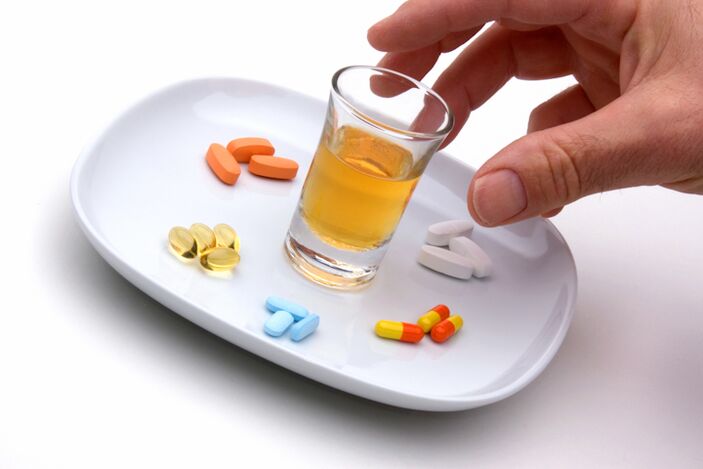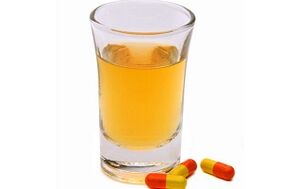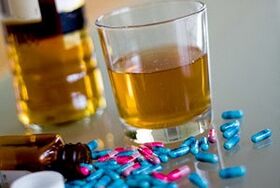Antibiotics, despite their large list of contraindications and wide range of side effects, are much-needed drugs that have saved more than one life. Because only antibiotics can kill bacteria in the body that cause dangerous diseases.

In the days before these drugs were invented, many people died from bacterial infections. Many diseases are considered incurable due to the lack of such drugs.
Antibiotics can not be taken without a doctor's prescription, and it is very important to follow the dosing rules. Also, you need to know that antibiotics are not compatible with alcohol. The answers to all questions related to taking antibiotics are in this article.
Antibiotic rule
The most important rule of thumb for taking antibiotics is to use them only in cases where it would not be possible without them. Indications for use are the symptoms of an acute bacterial infection that the body cannot cope with on its own. To get the desired therapeutic effect, antibiotics cannot be used indiscriminately.
You are required to follow the instructions below:
- You cannot prescribe antibiotics on your own without a medical degree. Only a doctor can determine the cause - viral or bacterial. With viral infections, antibiotics do not help, on the contrary, they can aggravate the course of the disease;
- You may not be able to stop the prescribed course of treatment if you feel better. Recurrence of the disease may occur;
- Do not change the dose of antibiotic during treatment. Reducing the dose threatens that bacteria will develop resistance and this increase will lead to side effects or overdose;
- You can not take antibiotics with tea, juice, and especially milk, otherwise the medicine will be useless. Milk, milk and fermented dairy products are not compatible with antibiotics, they reduce the effectiveness of the drug. You can take the medicine with only water, about 0. 5-1 glass;
- You cannot take antibiotics at any convenient time. It is important to follow the medication instructions and use the medication as described, namely: before, during, or after a meal. In addition, the frequency of dosing should be observed (1 time in 24 hours, 2 times in 12 hours, 3 times in 8 hours, etc. ) to produce the desired antibiotic concentration in the body;
- Do not combine taking antibiotics with physical activity;
- You cannot drink alcohol during the entire course of antibiotics.

Before prescribing antibiotics, it is imperative to inform the doctor of the following:
- medication being used at this time;
- pregnant or breastfeeding;
- kidney or liver disease;
- Diabetes.
And if the previous observation:
- the occurrence of side effects;
- the development of allergic reactions;
- recent use of antimicrobial agents.
When can I drink alcohol after completing my course of antibiotics?
Different antibiotics have different active ingredients. And, accordingly, each drug has its own terms of elimination from the body. In one case, this is a short period of time and it is possible to drink alcohol the next day, and in other cases, it is necessary to abstain from alcohol for 7 days.
Necessary information, as a rule, is indicated by the manufacturer in the annotation to the composition. If absent, it is better to wait 10 days. In addition, if the patient has kidney or liver problems, this time should be at least doubled.
How long after alcohol can you take antibiotics?
Alcohol is completely eliminated from the body 21 hours after the last drink. After this period, you can take antibiotics as prescribed. In any case, though, it's better to cut down on your drinking as much as possible if you're taking a course.
The reason for the incompatibility of alcohol and antibiotics
In addition to the fact that taking antibiotics puts a significant burden on the kidneys and liver, and taking it with alcohol only aggravates the situation, because ethanol slows down the work of the excretory system, there is another important reasonotherwise lead to incompatibility.
All substances that enter the human body begin to disintegrate until only the original parts remain. The same goes for alcohol and antibiotics. The danger of co-administration is that antibiotic molecules are similar to alcohol molecules. The body cannot recognize it correctly, leading to failure.
Alcohol is treated by the body as a drug, which leads to the fact that alcohol molecules are processed incorrectly by the body.
Consequences of not following the rules for taking antibiotics
In case of violation of the rules of taking antibiotics, as well as the wrong choice of drug or the wrong treatment regimen, undesirable side effects often occur.
Including:
- Dysbacteriosis. It is caused by an imbalance between the body's healthy and pathogenic microflora, which occurs at a time when pathogenic bacteria begin to outnumber the bacteria carrying out the body's protective functions. Dysbacteriosis manifests itself as a Candida infection or repeated diarrhea.
- Allergic reaction. Individual intolerance to the components of the drug plays an important role here. Allergic reactions are different, including irreversible ones.
- Antibiotic resistance of bacteria. Pathogenic microorganisms are able to adapt to the active ingredients of antibiotics, people only have to loosen the "grip ring". They continued to breed, and the epidemic continued with that.
Only a serious attitude to the use of antibiotics will bring the necessary therapeutic effect.
What antibiotics are strictly forbidden to take with alcoholic beverages?
There are antibiotics that are strictly forbidden to be taken at the same time as alcoholic beverages. This information, of course, will be included in the footnote of the medicinal product, in addition, the physician responsible for prescribing the antibiotic must warn the patient about this.
These drugs include the following antibiotics:
- The group of tetracyclines. Preparations based on them are often used in medicine, have a wide spectrum of action;
- Chloramphenicol group. This group of drugs often causes side effects, when combined with alcohol can increase the toxic effects of the drug;
- The lincosamide group. When taken simultaneously with alcoholic beverages, it has an adverse effect on the liver and central nervous system;
- aminoglycoside group. This class of drugs is one of the most powerful of the antibiotics. Poor compatibility with other drugs, not to mention alcohol
- The cephalosporin group. Drinking with alcohol causes symptoms of severe intoxication of the body, which leads to a sharp decline in health;
- Macrolide group. The combination of alcohol and an antibiotic will cause a strong toxic effect on the liver and brain;
- Antibiotics used to treat tuberculosis;
- Antibiotics used to treat leprosy.

Also on the pharmaceutical market there are drugs that do not have information about interactions with alcohol.
The lack of information about combinations with alcohol does not at all mean that combinations are allowed. It is not necessary to expose the body to unnecessary risks.
Possible consequences of combining antibiotics and alcohol
There is no way to know in advance how a particular organism will react to drinking alcohol-containing liquids and antibiotics simultaneously. Lesions can be done to any area of the body.
However, there are the most common consequences:
- Severe allergic reactions;
- Severe headache intolerable;
- Dizziness;
- Shortness of breath
- Chest pain, pressing character;
- A sharp increase or decrease in blood pressure;
- Clear the mind;
- Excessive sweating;
- Nausea or vomiting;
- Liver damage;
- Severe hangover and hangover;
- The need to repeat the course of antibiotics. Alcohol will reduce or destroy the effect of the drug.
The consequences can be even sadder, it all depends on the individual and his health. The negative consequence is always the suffering of the organism, in whole or in part. The negative effects can easily be avoided by simply eliminating alcohol along with antibiotics.
It should be noted that currently, through clinical studies, only a fraction of all antibiotics have been shown to be incompatible with alcohol. The rest of the drugs are still questionable or not fully understood.
One must understand for themselves the onset of possible consequences, focusing on drugs with potential ethanol incompatibilities that have been studied. Responsibility for your health should take precedence in any life situation involving drinking.
And to get the best treatment results, it is necessary to give up alcohol, any, even the weakest.


























